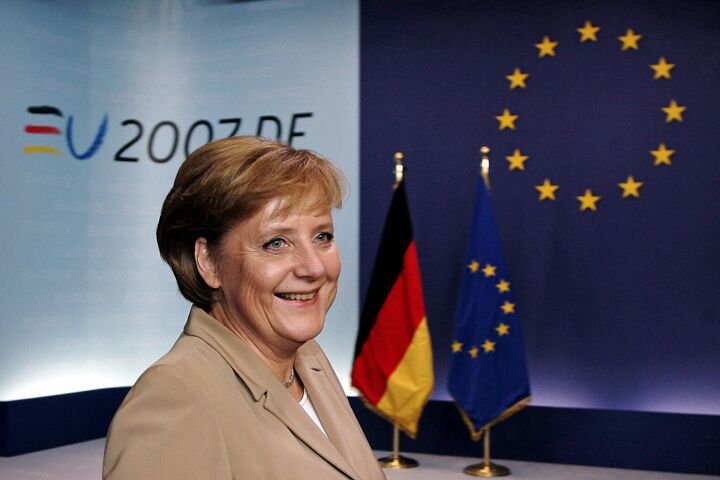
Germany Comes Out on Top With New EU Treaty
After a day and a half of intense negotiations, on June 23 German Chancellor Angela Merkel victoriously announced to the press that the European Union had agreed to an outline of a new treaty. Even with the notable concessions given to the UK and the Netherlands, and even with Poland delaying the adoption of the new voting system, Merkel still gained what she wanted: a symbol of Germany’s leadership.
When Germany’s Merkel entered the rotational EU presidency six months ago, she gave herself an ambitious agenda. She set out to revitalize the idea of a united, federated Europe by promoting a new framework to replace the failed EU constitution.
Progress to create a constitution had halted after a draft of the treaty was rejected by France and the Netherlands in public referendums two years ago. The constitution was too controversial for the EU presidents who followed, most of whom came from nations that either didn’t want a constitution or whose influence within the EU was too slight to coax dissenting nations on board. What was needed was a leader with a strong will from a nation of real influence. Angela Merkel took up the challenge and managed to produce an agreement.
It was no easy task, particularly considering the foot-dragging of Britain and Poland.
British Prime Minister Tony Blair, after voicing concerns about his nation’s sovereignty, received assurances that the proposed charter of fundamental rights would not supercede British law, that Britain could opt out of justice and home affairs proposals, and that tax and social security laws would not fall under EU control. However, he then ceded national sovereignty on all other items on the EU agenda—while still claiming victory for Britain.
And then there was Polish Prime Minister Jaroslaw Kaczynski, who threatened to derail the entire summit if the proposed voting system was not changed. Under the previous Nice Treaty, large member nations have greater voting power than the smaller ones. Therefore Germany, with a population of more than 80 million, has more say in the Council of Ministers than tiny Malta, which has a population of just over 400,000. But certain nations, such as Poland and Spain, were given additional voting rights beyond what their population would normally warrant. For example, the EU’s four biggest nations, Britain, Germany, France and Italy, held 29 votes each. Yet Poland and Spain, though their populations are much smaller, were given 27 votes each, granting them far more power than they otherwise would have had.
The new agreement proposed a voting system based more upon population, removing Poland and Spain from their privileged voting positions. Kaczynski, concerned that Europe is once again falling under the dominance of Germany, wanted the votes to be based on the square root of the countries’ populations instead. This would bring the voting power of midsized nations like Poland closer to the big four.
Merkel would have none of that. At the EU summit, she threatened to curb aid money to Poland and to even proceed, minus Poland, via the “two-speed Europe” concept—that is, reducing the core of the Union to a smaller, more dedicated group of nations and relegating the rest to an associated, but clearly secondary, status. Despite Kaczynski’s vehement opposition and legitimate concerns, just 36 hours later he caved in, clearly demonstrating Germany’s dominance and Merkel’s strong will.
“Merkel … fought like a tame lioness when she had to and like a wild lioness, when that was necessary,” said Luxembourg’s Prime Minister Jean-Claude Juncker in an interview with Spiegel Online on Tuesday. “She really acted, in a positive sense, like someone who wasn’t just the German chancellor,” he said.
That is exactly what many EU supporters want: a strong leader. Just as it did at this summit, we can expect Germany to continue to lead the way, being Europe’s most populous nation and biggest contributor, as well as possessing the largest economy and the most geopolitical power. Germany has proven itself willing and able to lead the EU toward further unification and superpower status.
Even though the old draft of the constitution was rejected, “much of the substance has been maintained” in the new agreement, admitted Chancellor Merkel. The bells and whistles of an EU state, such as a flag and anthem, may be left out, but the important directives of the old constitution are still in it—at least those that haven’t already been passed during the last two years of Brussels’ normal legislating. There is even a position that functions just like an EU foreign minister, it is just not named as such.
What emerged from this latest EU summit was a clear sense that Germany and other Europhile nations are willing to leave behind those that oppose the transformation of Europe into a federal superstate. They appear determined to get what they want. At some point, opposers of EU unification will either be cut out or forced to conform. In this case, Poland conformed. We expect Britain to eventually leave the EU.
The summit was a great success for Merkel and German leadership. As Stratfor observed, “Berlin, and moreover Merkel, gets to look like it was the great uniter of Europe. As Germany rises as the heavyweight of the continent, this is a great success against all odds. It solidifies Germany’s power to lead” (June 25).
Those who wish to see an EU superstate will increasingly look to Germany to drive it forward. And it will. To learn more on the direction that Europe is taking with Germany at its helm, read Germany and the Holy Roman Empire.
